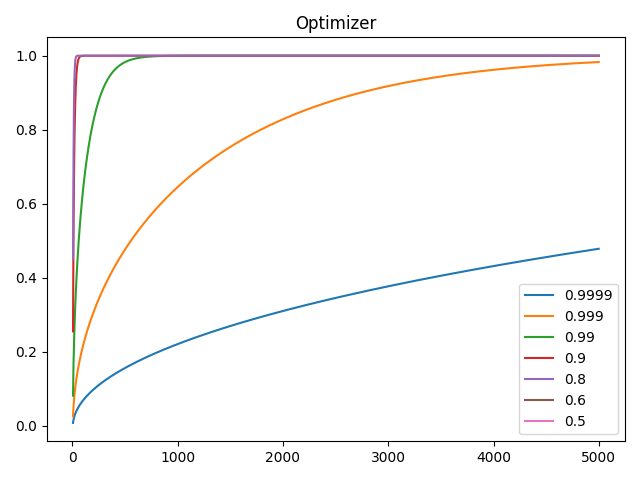Rectified Adam (RAdam) optimizer
This implementation is based on the official implementation of the paper On the Variance of the Adaptive Learning Rate and Beyond.
We have implemented it in PyTorch as an extension to our AMSGrad implementation thus requiring only the modifications to be implemented.
Adam optimizer sometimes converges to a bad local optima during the initial stages of the training; especially when training transformers. Researches use warmups to counter this; for the the initial training steps (warm-up stage) they use a low learning rate. This paper identifies the problem to be the high variance of adaptive learning rate during initial stages of training, and counters it using a new rectification term to reduce variance.
The paper also evaluates two variance reduction mechanisms: Adam-2k: Only compute the adaptive learning rate ( in Adam) during the first 2k steps, without changing parameters or calculating momentum (). Adam-eps: Adam with large .
Rectified Adam
Let and be the functions to calculate momentum and adaptive learning rate. For Adam, they are
Exponential moving average as simple moving average
The distribution of exponential moving average can be approximated as a simple moving average.
Here we are taking the simple moving average of the last gradients. satisfies the following,
which gives,
Scaled inverse chi-squared
From above we have where . Note that here is the standard deviation and different from for momentum.
Scaled inverse chi-squared is the distribution of squared inverse of mean of normal distributions. where .
Rectification
They prove that variance of decreases with when .
Therefore the variance is minimized at maximal which is . Let the minimum variance be
In order to ensure that the adaptive learning rate has consistent variance, we rectify the variance with
Approximating
They estimate based on first order expansion of 🤪 I didn't get how it was derived.
From distribution we have,
which gives,
Rectification term
We have
where is for . Lt and step be , and be the rectification term at step .
This gives,
139import math
140from typing import Dict, Optional
141
142import torch
143
144from labml_nn.optimizers import WeightDecay
145from labml_nn.optimizers.amsgrad import AMSGrad148class RAdam(AMSGrad):Initialize the optimizer
paramsis the list of parameterslris the learning ratebetasis a tuple of (, )epsis or based onoptimized_updateweight_decayis an instance of classWeightDecaydefined in__init__.pyoptimized_updateis a flag whether to optimize the bias correction of the second moment by doing it after addingamsgradis a flag indicating whether to use AMSGrad or fallback to plain Adamdegenerate_to_sgdwhether to use sgd when the rectification term is intractable.defaultsis a dictionary of default for group values. This is useful when you want to extend the classRAdam.
155 def __init__(self, params, lr=1e-3, betas=(0.9, 0.999), eps=1e-8,
156 weight_decay: WeightDecay = WeightDecay(),
157 optimized_update: bool = True,
158 amsgrad=False,
159 degenerated_to_sgd=True, defaults=None):175 self.degenerated_to_sgd = degenerated_to_sgd
176 super().__init__(params, lr, betas, eps, weight_decay, optimized_update, amsgrad, defaults)Take an update step for a given parameter tensor
stateis the optimizer state of the parameter (tensor)groupstores optimizer attributes of the parameter groupgradis the current gradient tensor for the parameterparamis the parameter tensor
178 def step_param(self, state: Dict[str, any], group: Dict[str, any], grad: torch.Tensor, param: torch.nn.Parameter):Calculate weight decay
189 grad = self.weight_decay(param, grad, group)Get and ; i.e. and without bias correction
192 m, v = self.get_mv(state, group, grad)Calculate the number of optimizer steps
195 state['step'] += 1Perform RAdam update
198 self.r_adam_update(state, group, param, m, v)Calculate rectification term
200 @staticmethod
201 def calc_rectification_term(beta2: float, step: int) -> Optional[float]:207 beta2_t = beta2 ** step209 rho_inf = 2 / (1 - beta2) - 1211 rho = rho_inf - 2 * step * beta2_t / (1 - beta2_t)is tractable when . We are being a little more conservative since it's an approximated value
215 if rho >= 5:217 r2 = (rho - 4) / (rho_inf - 4) * (rho - 2) / rho * rho_inf / (rho_inf - 2)
218 return math.sqrt(r2)
219 else:
220 return NoneDo the RAdam parameter update
stateis the optimizer state of the parameter (tensor)groupstores optimizer attributes of the parameter groupparamis the parameter tensormandvare the uncorrected first and second moments and ; i.e. and without bias correction
222 def r_adam_update(self, state: Dict[str, any], group: Dict[str, any], param: torch.nn.Parameter,
223 m: torch.Tensor, v: torch.Tensor):Get and
235 beta1, beta2 = group['betas']Bias correction term for ,
237 bias_correction1 = 1 - beta1 ** state['step']Bias correction term for ,
239 bias_correction2 = 1 - beta2 ** state['step']
240
241 r = self.calc_rectification_term(beta2, state['step'])Get learning rate
244 lr = self.get_lr(state, group)If is intractable
247 if r is not None:Whether to optimize the computation by combining scalar computations
249 if self.optimized_update:Denominator
251 denominator = v.sqrt().add_(group['eps'])Step size
253 step_size = lr * math.sqrt(bias_correction2) * r / bias_correction1Update parameters
256 param.data.addcdiv_(m, denominator, value=-step_size)Computation without optimization
258 else:Denominator
260 denominator = (v.sqrt() / math.sqrt(bias_correction2)).add_(group['eps'])Step size
262 step_size = lr * r / bias_correction1Update parameters
265 param.data.addcdiv_(m, denominator, value=-step_size)If is intractable do a SGD with momentum
268 elif self.degenerated_to_sgd:Step size
270 step_size = lr / bias_correction1Update parameters
273 param.data.add_(m, alpha=-step_size)276def _test_rectification_term():282 import matplotlib.pyplot as plt
283 import numpy as np
284
285 beta2 = [0.9999, 0.999, 0.99, 0.9, 0.8, 0.6, 0.5]
286 plt.plot(np.arange(1, 5_000), [[RAdam.calc_rectification_term(b, i) for b in beta2] for i in range(1, 5_000)])
287 plt.legend(beta2)
288 plt.title("Optimizer")
289 plt.show()
290
291
292if __name__ == '__main__':
293 _test_rectification_term()

